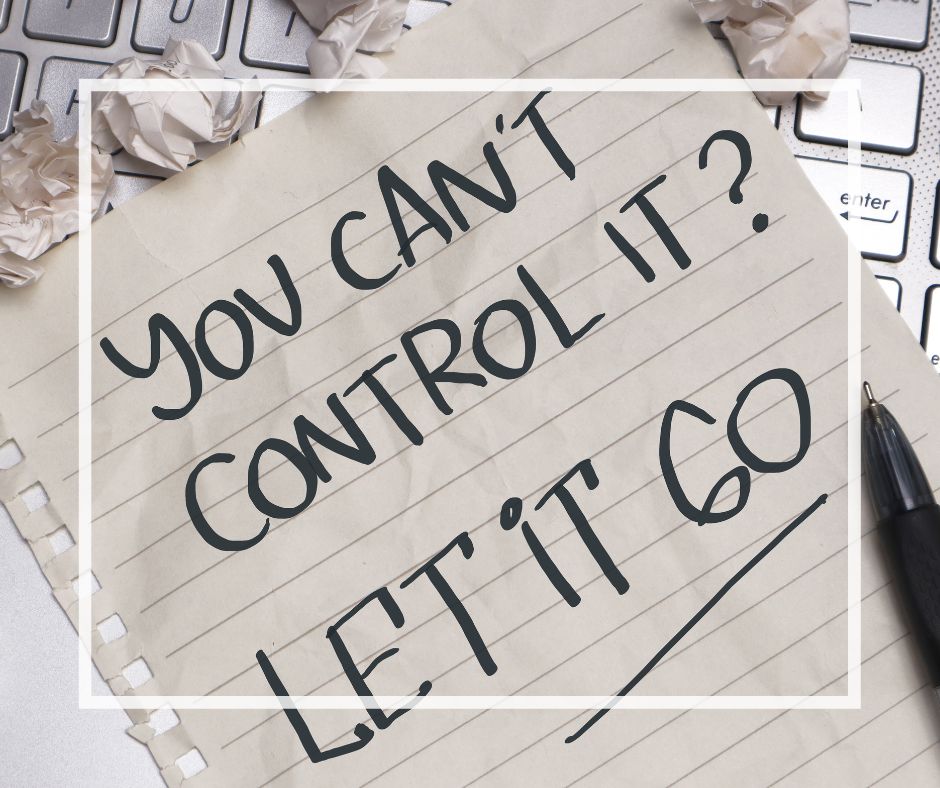If you’re the type of person who cannot seem to stop overthinking, there are ways to train your brain to stop worrying about things you can’t control.
Worrying is nothing to be ashamed of. In fact, it’s a normal part of our existence. We worry about a lot of things everyday – how to pay the bills, how safe our kids are at school, where to go on our next trip, or what our colleagues think about us. We even worry about petty things like who unfriended or unfollowed us on Facebook, which celebrity broke up with whom, or the fact that we have a bad hair day.
However, when worry becomes out of hand, it becomes a problem. Chronic or excessive worry will lead to mental health issues.
According to the National Institute of Mental Health, anxiety disorder is the most prevalent mental illness in the United States. About 18% of the United States population, which translates to 40 million adults, aged 18 to 54, have been diagnosed with anxiety disorder.
A lot of people want their worries to stop but don’t know how. Are you one of them?
Dr. Gala’s Quick Take
Yes, you can train your brain to stop worrying about things you can’t control. Focusing on the present moment can help in reducing this unnecessary stress of overthinking. Additionally, shifting negative thoughts can also lead to a more peaceful mindset. Try these methods to lessen your overthinking.
Here are 10 proven ways to train your brain to stop worrying about things you can’t control:
1. Accept the things you cannot change.

One of the reasons we worry too much is because we tend to focus on problems that are beyond our ability to solve, or things we cannot control. For example, we are planning a birthday celebration during the weekend and we worry about whether it will rain or not. Of course, there’s a possibility for it to rain. So, instead of worrying about it, why not be flexible and have an alternative plan? This will ease your worries.
Accepting the fact that you cannot control everything will lift a lot of burden from your shoulders … and will eventually end your worry.
2. Don’t try to guess what’s on someone’s mind.

Sometimes we try to create our own story about what’s going on in a person’s mind even if in actuality, we don’t have any idea. For example, if we said something a little bit off to a friend or a colleague which is not intentional, we automatically assume that they are mad at us. We then paint a picture of their enraged faces that we lose hours of sleep because of worry.
However, our fears are often just imaginations.
Trying to assume what’s on someone’s mind is most of the time useless and a waste of energy. Our mind is capable of creating scenarios that are both exaggerated and sometimes, even dangerous. If we let our minds dwell and obsess on these mental pictures, our worries will never end.
Instead of worrying, why not approach the person immediately to know what he or she is really thinking? This will save you a lot of trouble down the road.
3. Spend more time in the present moment.

There is nothing wrong with reminiscing about the past from time to time especially if you are thinking about something that inspires you. However, spending too much time in the past can pose some problems.
“When you spend too much time reliving the past in your mind then it is easy to start feeding your worries about the future. When you spend too much time in the future then it is also easy to get swept away by disastrous scenarios.” via How to Stop Worrying: 9 Simple Habits
The wisest thing you can do is just focus your time and attention in the present where you have the power to decide what works for you and carry out what you want to do.
So live in the present, take the time to savor the moment, breathe, and enjoy what it has to offer.
One of the best things you can do if you want to live in the present is to practice mindfulness. I came up with a list of 10 ways to practice mindfulness that will help you reduce anxiety and stress.
4. Embracing uncertainty to reduce anxiety

Sometimes we have this tendency to want to control everything. We want everything to be carefully outlined and followed, and if things don’t go as planned, we freak out and worry. We think that if things don’t go our way, everything will be a mess and chaos will follow. Sometimes because of worry, we even want to control the way people behave towards us or the way they think. But we all know this is impossible. We can never take control of everything, even our worries.
“Trying to overpower worry only ignites anxiety and worry thoughts. ‘When you have a thought you don’t like, your body responds by struggling physically to control it and escape from it. And that intensifies the thought,’ LeJeune says.
So your goal is actually the opposite — to interrupt the urge to stronghold your anxiety. It’s to allow acceptance and mindfulness to enter, LeJeune writes in The Worry Trap.” via 5 Steps to Reducing Worry and Anxiety
Nature has its own way of twisting things to the point that we are often left startled if we are not prepared. Once we understand that we are not in-charge of the universe and learn how to adapt, we will have less reason to worry.
5. Don’t be vain.

Vanity is a common cause of worry for a lot of people, not only for the younger generation but even for older people.
“We often worry about what people think of us. We worry endlessly that we might not meet society’s expectations; we worry about whether people will like us or not. With this mental outlook, we start to give too much importance to our ego; it means we are constantly looking for appreciation and the admiration of others. If we don’t get this appreciation, we start to worry that we are no good. If we can develop greater self-confidence and inner poise, then we will not worry about what others believe or think.
“We need to give less importance to the opinions of the world. Even if we get criticized, we should not worry because we should not identify our self-worth with the opinions of others. This is not easy to do overnight, but, if we can detach ourselves from judgments of others we will gain greater inner peace and avoid worrying over the relative insignificance of people’s judgments.” via Stop Worrying: 7 Effective Strategies for Dealing With Anxiety
The best solution to overcoming worry because of vanity is to not pay attention to what other people think about you. After all, this is something we cannot control. Instead, develop a healthy self-image by focusing on your best features and assets.
6. Talk to a friend.

When you worry about something, it is very important to have someone to talk to so that your worries will not plague your mind. If you have a close friend, discuss with them what’s going on. Just the thought that someone is listening and understanding where you’re coming from often eases your worry.
Most of the time, after talking to someone, you will realize in the end that what you’re stressed out about is actually nothing to worry about at all!
7. Step away from social media.

Social media, despite its many advantages, is now often the cause of our worries. “Research shows that social media can make us unhappy and feeling inadequate from constant comparison — yet we keep coming back. In a study, 55% of people reported feeling “worried or uncomfortable” when they were away from Facebook or email.” via 9 Simple Strategies to Stop Worrying
However, staying connected with social media also contributes to our worries. In Facebook, for example, we see our old classmates, friends, or relatives posting about their beautiful kids, their family, their travels, their dream house, their ideal jobs or businesses, their successes. So we compare ourselves to these people and often feel inadequate because we haven’t reached that “level” yet. What we don’t know, though, is that these people have problems too … but of course, they will only post the good things about their lives which make them look like they have a perfect life.
So if you feel like social media makes you feel insecure and inadequate, it’s time to step away. Try reducing the time you’re spending reading posts. Don’t let your life revolve around social media and focus on your own reality instead.
8. Write down your worries.

Writing or journaling is good therapy. When you’re in the midst of worrying, try writing everything down. This practice will calm your nerves and actually provides you some solutions along the way.
“Researchers found that writing down your worries worked best in the most anxious pupils creating a “level playing field” with their more confident colleagues. Students highly anxious about taking tests who wrote down their thoughts before the test received an average grade of B+, compared with the highly anxious students who didn’t write, who received an average grade of B-.
“Writing about your worries for 10 minutes before a forthcoming exam leveled the playing field such that those students who usually get most anxious during exams were able to overcome their fears and perform up to their potential,” Prof Beilock said.” via Write Away Your Worries If You Want to Succeed
9. Change your perspective.

“Energy flows where you focus your attention. Understand that you can choose to focus on positive rather than negative thoughts. In fact, as you become more positive, you’ll be better able to create more positive outcomes.” via 7 Healthy Ways to Deal with Incessant Worrying
Always choose to be optimistic. Train your brain to be calm and composed and look at the positive side of things. The more positive you get, the more positive the results will be.
10. Find the correct facts.

Sometimes we spend days worrying and realize in the end that the thing we are worrying about is actually not true. This is a sad fact that probably a lot of us have experienced.
“People worry when they have incorrect information or when they don’t have enough information. Let’s suppose you had doubts that a certain stomach ache means that you have a dangerous disease, in such a case talking to an expert can end your worries right away as you might discover that you have been misinformed. Don’t fall into the trap of collecting information from friends or incorrect sources but instead head for experts.” via 5 Ways to End Worrying
Most of the time, as you are presented with the whole picture, you will realize that there is really no reason to worry.
Are you ready to put a stop to worrying?
Although worry is a very natural thing, most of the time, it is unnecessary. Thus, you need to start to train your brain to stop worrying about things you cannot control. This will save you a lot of headaches. Once you follow the things that are presented above, hopefully, you will be able to minimize or eventually stop worrying and enjoy life more.
“If you came into my office, I’d ask you a lot of questions that would help us connect the dots … so that together we can deal with your toxic stress.
Every situation is unique and you need a plan that works for you. Not a one-size-fits-all solution.
If you’re thinking you can’t come into my office, don’t worry. I’ve created a program with all of my initial recommendations to help you unravel the mystery. You can use it at home and at your convenience.
So if you’re thinking that managing chronic stress just isn’t possible … or even the answer … for you, I want to show you what you may be missing.
And how you can identify the toxic stressors that are creating your symptoms with my Human Energy System Reboot. You can get started HERE.” – Dr. Gala













